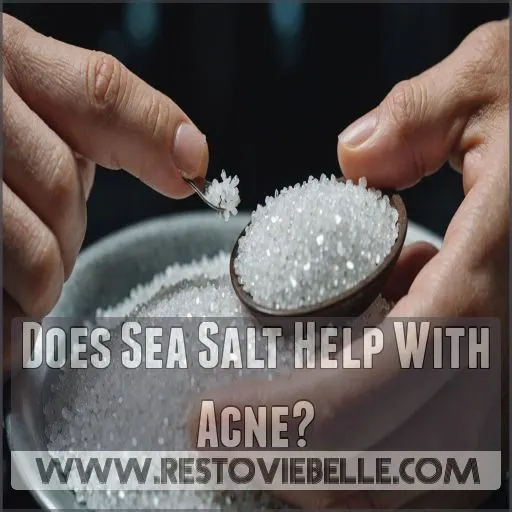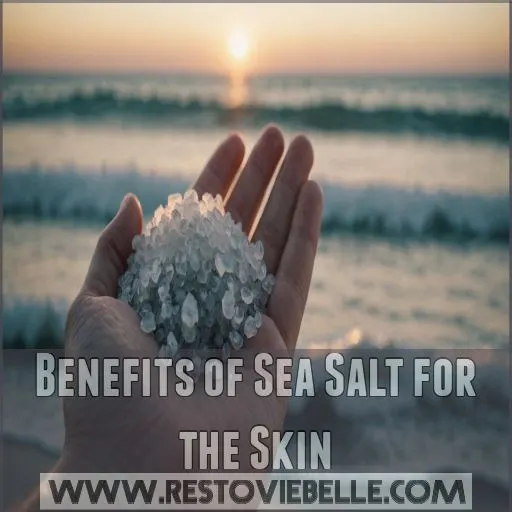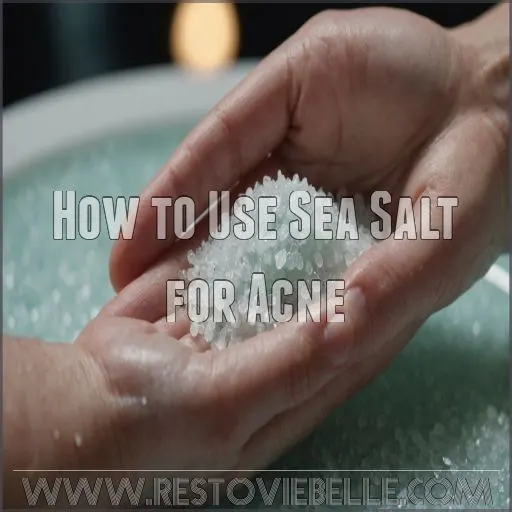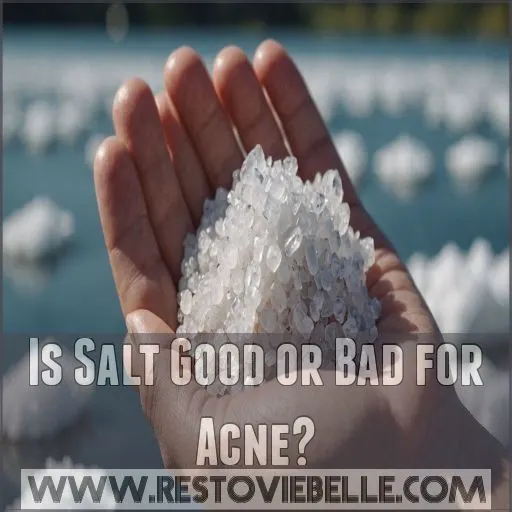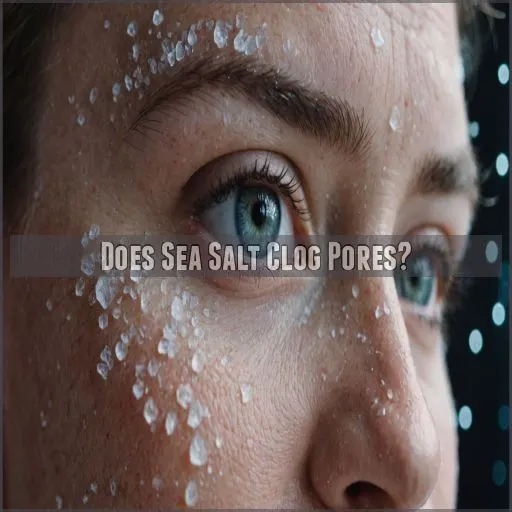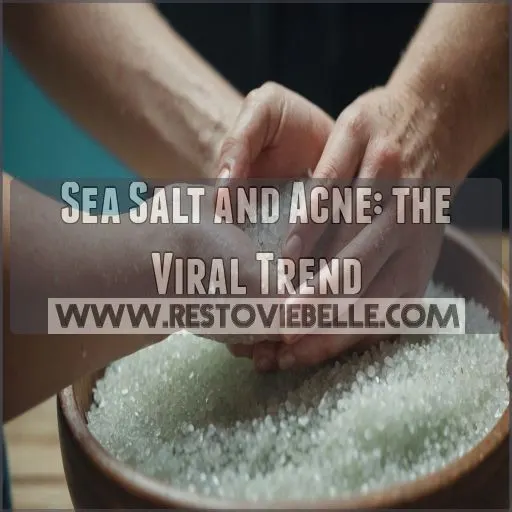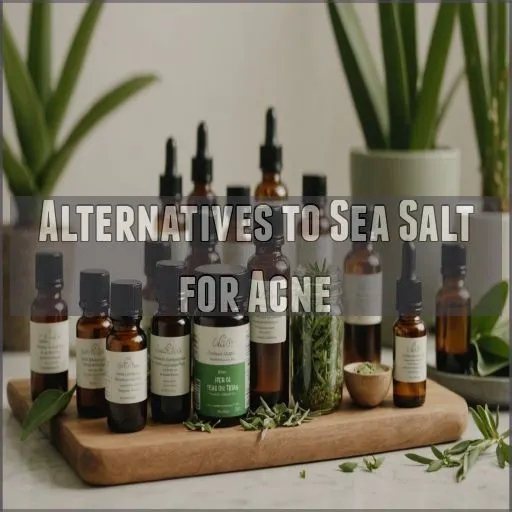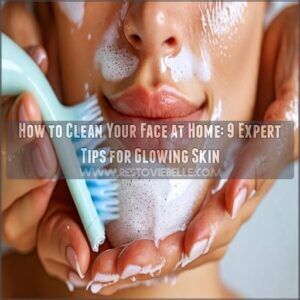This site is supported by our readers. We may earn a commission, at no cost to you, if you purchase through links.
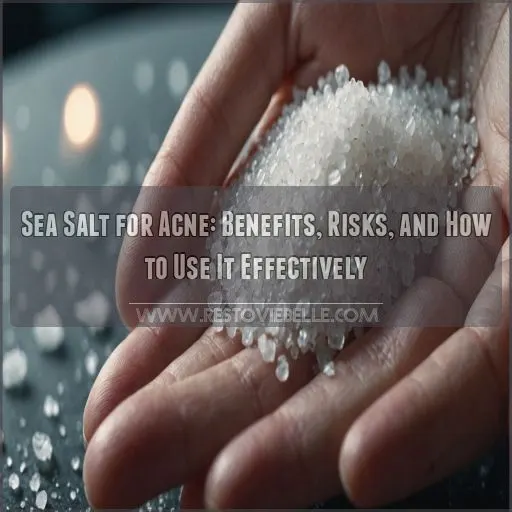 Thinking about using sea salt for acne? It’s a bit like that fabled miracle cure but with a twist—it might not be as magical as it seems. Sure, sea salt has exfoliating and anti-inflammatory properties, which could help reduce oil and soothe skin.
Thinking about using sea salt for acne? It’s a bit like that fabled miracle cure but with a twist—it might not be as magical as it seems. Sure, sea salt has exfoliating and anti-inflammatory properties, which could help reduce oil and soothe skin.
However, it won’t balance your skin’s pH or zap acne-causing bacteria like some claims suggest. Overuse can irritate, leaving your skin red and inflamed. Always check with a dermatologist before switching up your routine.
Want to discover how it compares to popular treatments like benzoyl peroxide and salicylic acid? Keep reading for the inside scoop!
Table Of Contents
- Key Takeaways
- Does Sea Salt Help With Acne?
- Benefits of Sea Salt for the Skin
- How to Use Sea Salt for Acne
- Is Salt Good or Bad for Acne?
- Does Sea Salt Clog Pores?
- Sea Salt and Acne: the Viral Trend
- Alternatives to Sea Salt for Acne
- Frequently Asked Questions (FAQs)
- Does sea salt help with acne?
- Is it good to put sea salt on your face?
- Is salt good or bad for acne?
- Does sea salt clog pores?
- Is sea salt effective for hormonal acne?
- How often can I use sea salt on skin?
- Does sea salt work on all skin types?
- Can sea salt reduce acne scars effectively?
- Should sea salt be mixed with other ingredients?
- Conclusion
Key Takeaways
- Just like a celebrity with too many claims, sea salt’s acne-fighting reputation is more hype than reality. It can gently exfoliate and calm your skin, but don’t expect it to be a magic bullet for acne. Always consult with a dermatologist before adding it to your skin routine.
- Handle with care! Sea salt can help absorb oil, but too much might leave your face feeling as dry as a desert. Overuse leads to irritation and redness, so sprinkle it into your routine with caution, like salt on fries.
- TikTok trends may have you reaching for sea salt, but dermatologists are less impressed. Proven treatments like salicylic acid or benzoyl peroxide offer safer, more effective acne solutions. Remember, not everything that glitters on social media is gold!
- If you’re wondering whether sea salt can erase your acne scars, it’s more like using a tiny sponge to mop up a flood. While it might smooth your skin a bit, reliable treatments like chemical peels or lasers hold more promise for tackling those tricky scars.
Does Sea Salt Help With Acne?
You’re wondering if sea salt can zap your zits, right?
While it has exfoliating and anti-inflammatory properties, dermatologists are quick to advise caution, as claims about balancing skin pH and killing bacteria don’t quite hold water.
Exfoliating and Anti-Inflammatory Properties
Sea salt’s exfoliating and anti-inflammatory properties may offer some relief for acne-prone skin. However, be cautious – aggressive scrubbing can lead to irritation. Opt for gentle, hydrating sea salt scrubs to slough off dead cells without overdoing it.
Balancing Skin PH and Killing Bacteria Claims
Moving on from exfoliating wonders, sea salt’s claimed pH balancing act seems like a fairy tale. While myths swirl about it zapping bacteria, experts suggest:
- pH balance claims fall flat.
- Benzoyl peroxide better for bacteria.
- Dead Sea salt offers other benefits.
Dermatologists’ Perspective on Sea Salt for Acne
While influencers swear by sea salt’s magic for acne, dermatologists aren’t all on board. You can find more information about sea salt spray if you’re interested in learning more about it.
They argue there’s scant evidence supporting these DIY tales.
Sea salt might help slightly for oily skin due to its drying effects, but consult a dermatology provider to avoid potential side effects.
Risks of Using Sea Salt Water as a Treatment
Dermatologists raise their eyebrows at sea salt water treatments for acne.
They caution against risks like:
- Skin irritation can worsen acne.
- Over-exfoliation leading to micro tears.
- Delayed care causing hyperpigmentation or scarring.
It’s a rocky road without proper guidance or a calming facial toner!
Benefits of Sea Salt for the Skin
While sea salt may not be a cure-all for acne, it does offer some intriguing benefits for your skin.
From its natural exfoliating properties to its potential anti-inflammatory effects, incorporating sea salt into your routine could be a game-changer, especially if you have dry or rough patches.
Natural Physical Exfoliant for Psoriasis
Feel like you’re on a psoriasis roller coaster? Sea salt acts as a natural physical exfoliant, gently sloughing off dead skin to reveal a smoother texture.
While pondering salt vs. sugar scrubs, consider the exfoliation frequency; over-scrubbing can worsen psoriasis triggers, so balance is key!
Anti-Inflammatory Properties and Mineral Content
Sea salt’s mineral content is like a backstage crew, silently supporting your skin actor. With anti-inflammatory properties, it can calm redness and irritation.
Embrace these natural ingredients, like valerian root and Osea Sea Minerals Mist, to reduce inflammation and enhance skin health.
Absorbing Excess Oil for Acne-Prone Skin
In your skincare routine, absorbing excess oil is where sea salt might lend a hand in acne prevention.
Acting like a sponge, it helps soak up that extra shine.
While it’s tempting to go full DIY, stick to oil control products designed for skincare efficiency.
Improving Skin Roughness, Redness, and Hydration
You might be surprised to learn that sea salt can actually improve your skin’s roughness, redness, and hydration.
One study found that bathing in magnesium-rich Dead Sea salt solution enhanced skin smoothness, reduced irritation, and boosted moisture levels for eczema patients.
Who knew the ocean could be so soothing?
How to Use Sea Salt for Acne
Regarding acne, sea salt might seem like a mysterious ingredient from a pantry raid gone skincare experiment.
You can try sea salt-infused face mists or hydrating scrubs, but remember to balance curiosity with caution to avoid turning your skin into a sandy beach.
Sea Salt-Infused Face Mists for Oily Skin
Face mists infused with sea salt can be a boon for oily skin.
These spritzes lightly hydrate while reducing shine.
When making your DIY face mist, remember:
- Use distilled water.
- Add aloe vera gel.
- Include a few drops of essential oil.
- Spray once daily.
Sea Salt Scrubs for Rough or Extra-Dry Skin
After exploring sea salt-infused face mists for oily skin, consider using a DIY sea salt scrub recipe to tackle rough or extra-dry areas.
Benefits include removing dead skin cells and improving texture, like using a pumice stone for your feet.
When crafting, mix sea salt scrub ingredients wisely and use sparingly.
Hydrating Scrubs With Sea Salt for Exfoliation
For a gentler exfoliation, reach for hydrating scrubs infused with sea salt.
The mineral-rich crystals slough off dead cells without stripping your skin.
Just be sure to pair them with soothing, moisturizing ingredients if you have sensitive areas.
Sea Salt-Based Bath Soaks for Back or Chest Breakouts
Looking to tackle back or chest breakouts? Sea salt soaks might be your ticket! They can help tame acne by reducing oil and inflammation.
Mix sea salt in warm water with soothing ingredients like oatmeal or lavender.
Just don’t expect a miracle cure—it’s no magic bullet!
Is Salt Good or Bad for Acne?
You might think sprinkling a little salt on your skin sounds like trying to pickle your pimples, but sea salt has some intriguing potential benefits for acne.
Let’s explore whether this kitchen condiment can truly help clear your skin or if it’s more like rubbing salt in the wound!
Potential Benefits of Salt for Acne
You’ve explored using sea salt-infused face mists to balance oily skin, which is a great idea. Read more about balancing oily skin.
Now, let’s explore sea salt’s potential benefits for acne: its magnesium can ease inflammation, and gentle exfoliation might help clear out pores.
Though claims are afloat, continue seeking products that work best for your skin.
Risks of Using Salt for Acne
Excessive salt use can backfire, causing skin irritation, over-exfoliation, and even scarring or hyperpigmentation. Delayed proper acne treatment due to DIY salt remedies may worsen breakouts. Moderation is key – consult a dermatologist to find the right balance for your unique skin.
- Potential for skin irritation and inflammation
- Risk of over-exfoliating and damaging the skin barrier
- Delaying effective acne treatment, like using apple cider vinegar for acne, can lead to scarring
Comparison With Other Skincare Ingredients
Ever wondered how sea salt stacks up against skincare heavyweights like salicylic acid or benzoyl peroxide? It’s like comparing apples and oranges; each has unique benefits.
Sea salt gently exfoliates, while salicylic acid digs deep.
Meanwhile, clay masks detox and sulfur targets bacteria.
Choosing the Right Salt for Skincare
To choose the right salt for your skincare routine, consider these tips:
- Understand different sea salt types
- Compare salt vs. sugar scrubs
- Use DIY salt scrubs cautiously for sensitive skin, especially if you have sensitive skin
- Match salt to your skin type
Does Sea Salt Clog Pores?
You might think sea salt is nature’s scrubber, capable of unclogging pores and leaving skin fresh and clean.
While it’s true that sea salt can help exfoliate dead skin, overdoing it might transform your face into a desert landscape, complete with cracks and irritation!
Exfoliating Properties and Pore Unclogging
A little sea salt can work wonders as a natural exfoliant, helping to unclog pores and slough off dead skin cells.
But go easy – too much scrubbing can backfire, leading to irritation and dryness.
Stick to gentle, store-bought sea salt scrubs rather than DIY masks, and listen to your skin’s cues to avoid over-exfoliating.
Risks of Over-Exfoliation and Irritation
When using sea salt, remember Goldilocks’ advice: not too much, not too little. Over-exfoliation can damage the skin barrier, and micro-tears leave you with redness and inflammation.
Keep these tips in mind:
- Limit exfoliation frequency to avoid problems.
- Listen to your skin.
- Watch for sensitive skin signals.
- Choose products carefully to maintain a healthy glow.
Precautions for Sensitive Skin
Sensitive skin’s like a delicate flower—handle with care to prevent sea salt sensitivities.
Over-exfoliating can lead to skin irritation risks, so opt for gentle exfoliation tips instead.
DIY salt scrub dangers lurk around every corner, so pick alternative ingredients if you’re itching to avoid trouble.
Balance is key, so don’t go diving headfirst into a sea salt frenzy!
Sea Salt and Acne: the Viral Trend
You’ve probably seen TikTok users raving about seawater clearing up their acne, and the views are piling up faster than laundry on a teenager’s bedroom floor!
Dermatologists, while skeptical, can’t help but raise an eyebrow at this new trend, pointing out that the science mightn’t quite back up those beachy claims.
TikTok User’s Claim of Clearing Acne With Sea Salt
A recent TikTok video claiming sea salt cleared a user’s acne has gone viral, sparking interest in this DIY skincare trend. While the anecdotal results seem promising, it’s important to understand the science behind sea salt’s effects on acne-prone skin. Let’s take a closer look, shall we?
- Potential benefits: natural exfoliation, anti-inflammatory properties
- Risks: over-drying, irritation, delayed professional treatment
- Expert opinion: limited evidence, not a cure for cystic acne
- Scientific perspective: sea salt’s pH and antimicrobial claims lack proof
- Safer alternatives: glycolic acid, salicylic acid, benzoyl peroxide
Dermatologists’ Perspective on the Trend
You saw a TikTok trend where sea salt supposedly zaps acne away like magic.
But dermatologists are raising eyebrows.
They say while sea salt might dry out pimples temporarily, it can’t replace acne treatment.
In fact, overdoing it can lead to irritation and worse breakouts.
Scientific Evidence for Sea Salt’s Benefits
While TikTok’s sea salt buzz stirs the pot, let’s sprinkle a bit of reality on it. Scientific backing for sea salt’s acne benefits remains on shaky ground.
- Sea salt research is limited: Few studies confirm its effectiveness.
- Dermatology studies favor proven treatments.
- Salt benefits aren’t a magic bullet.
- Caution is key in acne treatment.
Comparison With Other Skincare Trends
Jumping from science to trends, the sea salt hype meets its match against chemical exfoliants, clay masks, or even retinol.
It’s like a wild rodeo ride—exhilarating, but not always effective.
Instead of relying on TikTok buzz, lean toward proven heroes like salicylic acid.
Alternatives to Sea Salt for Acne
If sea salt isn’t your cup of tea, don’t worry – there are plenty of other natural ingredients that can help tackle your acne woes.
From soothing aloe vera to clarifying charcoal, the options are endless.
Explore the alternatives and find the perfect fit for your unique skin type and concerns.
Natural Ingredients for Acne Treatment
Speaking of ocean tales, your skincare journey might benefit from natural alternatives like tea tree oil, aloe vera, and honey.
These gentle treasures are renowned for their soothing touch and zapping acne like there’s no tomorrow.
Clay masks purify, while witch hazel tones like a pro.
Isn’t it time to give your skin a well-deserved break?
Comparison With Sea Salt’s Properties
Sea salt boasts unique properties that stand out against alternatives like Epsom salt, baking soda, and Himalayan salt.
Its exfoliating and antimicrobial abilities offer skincare potential, but it’s not all sunshine and rainbows.
Like your quirky neighbor’s pool party, too much can lead to dryness.
So, finding the right balance is key, just as you’d with table or Dead Sea salt.
Choosing the Right Skincare Routine
While sea salt might seem like the new beauty darling, choosing a skincare routine for acne-prone skin is more like figuring out a tricky map.
Avoid falling for myths or DIY skincare blunders.
Opt for products with ingredients like salicylic acid or benzoyl peroxide. They’re the trusty GPS for acne, unlike sea salt, which sometimes leads to a detour you didn’t bargain for.
Frequently Asked Questions (FAQs)
Does sea salt help with acne?
Ah, sea salt – the mythical potion promised by TikTok for acne.
It might soak up oil, but don’t bet the farm on it.
Dermatologists suggest sticking with proven skincare to really tackle those pesky pimples.
Is it good to put sea salt on your face?
Using sea salt on your face can be tricky. It may help absorb excess oil, but it could also dry out and irritate your skin. Stick to gentle, proven acne-fighting ingredients instead of DIY sea salt treatments, especially if you’re concerned about for hair growth.
Is salt good or bad for acne?
Salt for acne is like a double-edged sword; it can absorb excess oil but also dry and irritate your skin.
Experts recommend sticking to proven treatments.
Save the salt for seasoning, not skincare.
Does sea salt clog pores?
You might think sea salt clogs pores, but it actually helps clean them by absorbing excess oil and exfoliating dead skin cells.
However, overdoing it can irritate your skin, so easy does it for the best results.
Is sea salt effective for hormonal acne?
Like chasing rainbows with a lasso, sea salt’s effectiveness on hormonal acne is largely wishful thinking.
While it might reduce redness temporarily, there’s little evidence behind it.
Consider chatting with a dermatologist to explore more proven options.
How often can I use sea salt on skin?
Moderation is key when using sea salt on your skin.
Stick to once or twice a week, and always follow up with a moisturizer.
Overdoing it can lead to dryness and irritation, so listen to your skin’s needs.
Does sea salt work on all skin types?
Sea salt’s effects vary by skin type.
It can absorb oil and exfoliate well,
but sensitive skin might feel like it’s been through a sandstorm.
Always try a patch test to avoid feeling like a fish out of water!
Can sea salt reduce acne scars effectively?
While sea salt’s exfoliation helps with skin texture, it won’t rub away acne scars like a magic eraser. Scars are tricky beasts; proven methods like chemical peels or laser treatments offer better chances of success.
Should sea salt be mixed with other ingredients?
Sprinkle a pinch of creativity by mixing sea salt with soothing ingredients like aloe vera or honey. Remember, too much of a good thing could be overkill. Always test on a small area before wider use!
Conclusion
Ultimately, while sea salt may offer some benefits for acne-prone skin, it’s not a one-size-fits-all solution.
In fact, a whopping 85% of dermatologists caution against overusing sea salt, as it can lead to irritation.
Your best bet? Consult a skincare professional to develop a personalized routine that incorporates sea salt thoughtfully, alongside other proven acne-fighting ingredients like benzoyl peroxide or salicylic acid. With the right approach, sea salt can be a helpful addition to your acne-fighting arsenal.

